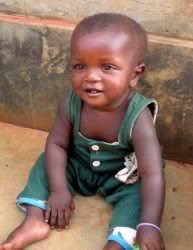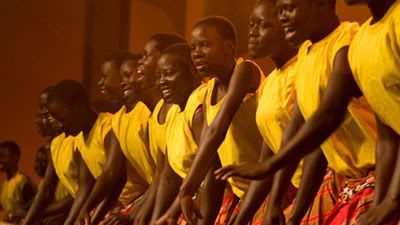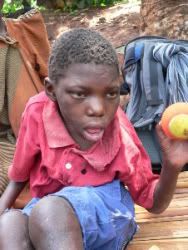Of course, what Buerk had left out of his original broadcast, which led to the Band Aid/USA for Africa/Live Aid projects, was that the famine was much exacerbated by attacks upon civilians in Tigray ordered by Ethiopian dicatator Mengistu Haile Mariam. Since most of the nearly £1bn ($1.4bn) was donated by governments who by standard practice deal with foreign countries on a governmental level, much of the aid was skimmed off by Mengistu so he could intensify his warmakin
 g on his own people, and his paramilitaries became known as the "wheat militia" because of the cut they took from aid in kind.
g on his own people, and his paramilitaries became known as the "wheat militia" because of the cut they took from aid in kind.Bob Geldof, who so memorably bludgeoned viewers to "give us the [expletive deleted] money", was an accomplice to the deception, because in typical paternalistic fashion the BBC decided that access to the truth would seal public wallets shut. One wonders if his sidekick Bono, whose band U2 is currently enjoying free publicity courtesy of the BBC's licence-payers, was also aware of the artifice. Even though the movers of Live Aid are so sacred within liberal hagiography that to question their results is even now frowned upon, fundraising projects - especially for Africa - have been sullied ever since through a sense that something went badly wrong.
Then, coming to the Draughty Old Fen, I learnt of the Watoto movement. It offered no naïve promises about feeding the world: one of the founders, Zimbabwe-born pastor Gary Skinner, upon visiting a Ugandan village, met with a
 n older woman who had lost six of her seven children to AIDS, was nursing her seventh through her last days, and was responsible for the care of 23 grandchildren. He was reminded of James 1:27: "Religion that God the Father accepts as pure and faultless is this: to look after the orphan and the widow in their distress and to keep oneself from being polluted by the world".
n older woman who had lost six of her seven children to AIDS, was nursing her seventh through her last days, and was responsible for the care of 23 grandchildren. He was reminded of James 1:27: "Religion that God the Father accepts as pure and faultless is this: to look after the orphan and the widow in their distress and to keep oneself from being polluted by the world".I might have remained sceptical had I not actually had the chance to meet members of the globe-trotting Watoto choir, who have played more than once in Cambridge's Trinity College Church. They sang both hymns and traditional songs, and testified with hands raised as to how Jesus had saved them. The latter is not a way in which I personally am accustomed to expressing Christianity, but it was disappointing to hear some of the audience mutter about "brainwashing": neither they nor I had seen a generation of our families wasted away by a disease spread as much through custom and prejudice as by the usual channels, nor indeed had we been abducted to serve as child soldiers - another constituency Watoto serves. It's a term bandied about so often as to have lost much of its meaning, but reading Ron Borges' hard-hitting yet inspirational story of boxer and former child soldier Kassim "the Dream" Ouma illustrates the hellish life of a child abducted in order to kill.

 Through the same people who introduced me to Watoto, I met a worker from the Spring of Hope foundation, again operating in Uganda, which works with children who are neglected or even abandoned because they are disabled. Again a Christian outfit, it recognises three criteria for judging the success of a project:
Through the same people who introduced me to Watoto, I met a worker from the Spring of Hope foundation, again operating in Uganda, which works with children who are neglected or even abandoned because they are disabled. Again a Christian outfit, it recognises three criteria for judging the success of a project: I recently attended a coffee-morning for Spring of Hope where I bought a bowl painted
- When the disabled children and their families are fully allowed to participate in any community event without discrimination.
- When the perception of the community changes from negative to positive and the disabled are seen as being assets rather than liabilities.
- When they will not label a child as disabled but instead talk of "Jessica - the girl with the great smile".
 with the world centred on Africa - into which I can put the things I buy at coffee morning that I imagine I can't manage without - and we learned of stories of the children the charity has worked with. Their pictures are mounted around this post; click on the pictures to read the stories.
with the world centred on Africa - into which I can put the things I buy at coffee morning that I imagine I can't manage without - and we learned of stories of the children the charity has worked with. Their pictures are mounted around this post; click on the pictures to read the stories.One thing that impressed me about Watoto and Spring of Hope was that neither of them request something for nothing, although donations are obviously welcome. Both sold locally-produced jewellery, ceramics and textiles, and the members of the Watoto choir literally sing for their supper all around the world - and are begged to return.
Like many charities, they're also "adopted" by various institutions: for example, here in the fens, Spring of Hope is helped by, among others, Godmanchester Community Primary School and the RNIB [Royal National Institute for the Blind] College, Loughborough.
In
 Great Britain at least, larger charities with matching overheads are pulling back on some of their smaller operations at the moment, for instance distributing blankets to nursing homes or knitted toys to children. Personally, I prefer to act locally: not necessarily in the sense of charity beginning at home, as important as that is, but when looking abroad, dealing with smaller groups acting to ease a specific group of problems in an easily-identified locality. Money's even harder to find than it has been for a long time, so my own solution as Lent comes will be to forego a couple of pints a week and send the money on.
Great Britain at least, larger charities with matching overheads are pulling back on some of their smaller operations at the moment, for instance distributing blankets to nursing homes or knitted toys to children. Personally, I prefer to act locally: not necessarily in the sense of charity beginning at home, as important as that is, but when looking abroad, dealing with smaller groups acting to ease a specific group of problems in an easily-identified locality. Money's even harder to find than it has been for a long time, so my own solution as Lent comes will be to forego a couple of pints a week and send the money on.I trust Spring of Hope and Watoto because they follow the example of Jesus in taking care of people's earthly needs before talking about God, and there are many more like them. If there's a time for asking do they know it's Christmas, it's probably quite a way down the road from gaining folks' trust, dressing their wounds and listening to their stories.












I liked the idea of donating the pint proceeds.
ReplyDeleteI think I'm having to give up my 2nd cup of coffee. I decided to give up browsing the web, and am considering giving up reading novels, but hadn't decided yet. Kinda late, huh?
We were at Linda's last night, and a good time was had by all. Kids enjoyed running through the woods with other kids, and hearing the owls calling.
I'm always late about deciding about Lent, so I'll stick with the idea about the pints. I don't think I'd ahve the willpower to give up the web!
ReplyDeleteIt's great to hear you had such a nice time at Linda's. I haven't heard owls for some years, signs of urbanisation, I guess. I love birds - do you know what sort of owls live around Linda's place?
I think my dad said (when the same kind called at my folks' house) they were barred owls. But I'm not sure.
ReplyDeleteWe, 5 minutes from downtown in the 3rd largest city in the U.S., have screech owls!
You have screech owls that close to the city? Wow!! Can you hear them at night?
ReplyDeleteThe first time I heared an owl was when I went to the Trossachs, basically the southern Highlands, with Primary 7, the last year before secondary school, age 11. I've heard them only twice thereafter, alas.
There's a little one that sits in a tree at the corner of my street. It's maybe 6 inches tall (or less?). My kids are scared of it - sounds like Halloween.
ReplyDeleteThe area surrounding this city has urbanized horribly fast. There's lots of wildlife has moved into the city. Its mostly kind of nice.
It sounds really nice. We had a muntjac deer in the garden once, which was wonderful. We had a few peacocks a while ago that had escaped from a mansion house - they'd climb up onto cars and, looking down and seeing their reflection, think they were seeing another peacock and cry loudly at it - sometimes they were worse than the rooster! And the mess...I was glad we don't own a car!
ReplyDeleteThere's a lot of urbanisation planned for here, I don't know how much longer we'll be living opposite fields for. And still the immigrant come in through an open door...but I guess that's another story.
I think the problem here is more that it's been made so difficult to live in the small towns. There are very many small towns that are dying in population, because the people don't seem able to make a living there. The cities get bigger and bigger, but the really rural areas seem to maybe get less populated. I don't like it.
ReplyDeleteI think that's happening all over - certainly in England, where big land-owning conglomerates and price-fixing supermarket chains are making it more and more difficult for people to make a living on the land, unless they're employed by one of the above. On the other hand, when I left Scotland, people were starting to get tired of big cities and moving out to more rural areas - which, ironically, is fuelling urbanisation...I don't know the answer.
ReplyDeleteBut I'm sure an unstaunched flow of people into the country is part of the problem, and people are at last starting to wake up to the fact that there's nothing sinister in worrying about the quality of folk coming to live here.